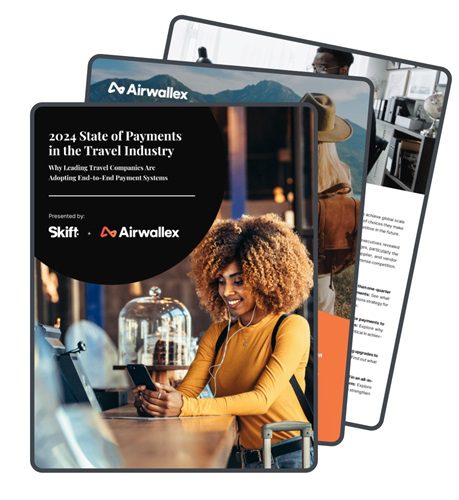 Many global travel companies face a pressing issue that threatens their profitability—inefficient payment systems. According to a comprehensive study conducted by Airwallex in collaboration with Skift Research, 66% of travel executives report that outdated and complicated payment processes erode their fragile profit margins.
Many global travel companies face a pressing issue that threatens their profitability—inefficient payment systems. According to a comprehensive study conducted by Airwallex in collaboration with Skift Research, 66% of travel executives report that outdated and complicated payment processes erode their fragile profit margins.
Cross-Border Payments: A Growing Challenge
The study surveyed 473 travel executives across seven major markets, including Australia, China, Hong Kong SAR, Israel, Singapore, the United Kingdom, and the United States. The findings reveal that 70% of these executives find cross-border customer payments increasingly challenging due to the diverse array of new payment methods. This complexity is significant, given that at least a quarter of their revenues come from international transactions.
Jack Zhang, Co-founder and CEO at Airwallex commented on the research findings: “As global travel continues to boom, travel companies increasingly rely on quick and seamless cross-border payments to surpass customer expectations at every touchpoint. However, our latest study shows that slow and outdated payment processes are increasing the cost of moving money internationally, which is eating into their profits—modest at the best of times.”
The Call for Modernization
Modernizing financial operations is not just a recommendation but a critical priority. The research indicates that 90% of travel executives plan to upgrade their payment technology within the next 12 months. This move is essential to reducing the costs and friction of managing cross-border transactions. For smaller players in the industry, a unified and scalable payment solution could be the key to levelling the playing field with larger, more established competitors.
Shifting Payment Preferences Post-Pandemic
The COVID-19 pandemic has accelerated changes in customer payment preferences. The report highlights that 88% of travel executives have observed a shift towards local payment methods and peer-to-peer payment apps, especially in Asian markets. While credit cards, debit cards, and digital wallets remain prevalent, the rise of localized payment options adds complexity to financial operations.
Rafat Ali, CEO and Founder of Skift, emphasized the importance of adapting to these changes: “Our survey of global travel executives uncovered new, unique, and even surprising insights into why unified payment and financial systems are critical in meeting today’s traveller expectations. Amid an unprecedented rise in international tourism, the report intends to give travel companies a framework to expand their knowledge base and build more efficient, effective, and profitable businesses through modernized payment and financial operations systems.”
The Financial Strain of Cross-Border Transactions
With nearly 40% of travel executives reporting that half of their revenues come from international customer payments, the complexity of handling different market payment needs and foreign exchange (FX) fees is a significant burden. Managing multiple supplier and vendor payments across various countries also poses substantial challenges. The volatility of FX rates and the intricacies of reconciling bookings, fees, commissions, and refunds further complicate financial operations for over 50% of the surveyed executives.
Inefficiencies Impacting Profit Margins
The detrimental impact of inefficient payment systems is clear. Nearly two-thirds of travel finance executives report that outdated or complicated payment processes affect organizational efficiency and profit margins. Nine in ten executives noted at least a 2% erosion in profits due to these inefficiencies, with over a third experiencing losses as high as 10%.
A Roadmap for Financial Transformation
Given the significant financial challenges highlighted by the study, there is a strong push towards adopting an all-in-one payment and financial operations platform. 80% of executives expressed interest in such a solution, recognizing its potential to streamline processes and enhance profitability.
Access the Full Report
Read the full report by Airwallex and Skift Research here for a detailed analysis and recommendations on how travel companies can modernize their financial operations to achieve global success.
Key Findings at a Glance
- Changing Customer Payment Preferences: 88% of executives observe a shift towards local payment methods post-pandemic.
- Cross-Border Payment Challenges: 70% find handling various payment types across markets increasingly complex.
- Revenue from International Payments: 75% earn more than a quarter of their income from cross-border transactions.
- Operational Inefficiencies: 66% say outdated payment systems impact profits, with 90% prioritizing upgrades.
- Interest in Unified Solutions: 80% are keen on an all-in-one payment and financial operations platform.
The research by Airwallex and Skift Research underscores the urgent need for travel companies to revamp their financial systems. Addressing these payment inefficiencies will be crucial for sustaining profitability and competitive advantage as the travel industry continues to recover and grow.
- ✈️ Singapore Airlines Taps OpenAI Magic — Without Losing Its Soul
- DWTC Draws 2.65M Visitors, Cements Dubai’s Event Lead
- Travel Cancellation Traps: Refund Nightmares & Booking Wins
- Luxury Soars: Juneyao Air’s 5-Star Business Class from PVG to SYD
- Personal Travel Manager Shines at the Darwin Travel Festival
- Why Entitled Airline Passengers Are Ruining Air Travel
- Sustainable Hospitality Starts Now: Join the Change
- NaviSavi Joins Forces with Arabian Travel Market 2025
- Thailand’s Top 10 Travel Trends Transform Southeast Asia’s Future
- Make Waves at Galaxy Macau’s Grand Resort Deck




















